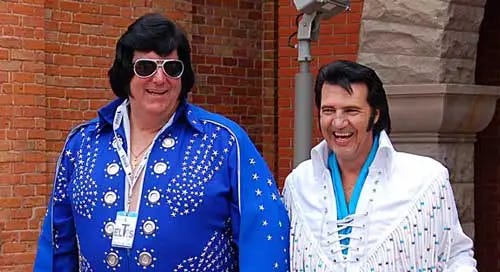Back in 1995, Billy Cann, an Elvis tribute artist, worked with the Town of Collingwood in Ontario to host The Canadian National Elvis Tribute and Convention.
That first festival featured 35 Elvis impersonators. In 1996, the festival aligned with Elvis Presley Enterprises to licence the event. The next year, it was officially known as the Collingwood Elvis Festival.
The festival quickly grew in size and became a major economic driver for the community.
During the week of the festival, Elvis tribute artists performed in local bars and night clubs, while Vegas-style shows were held at the arena. There was also a main stage in the centre of town. A candlelight vigil and the Elvis Tribute Artist Parade was also held. The festival was where many artists began their careers performing as Elvis.
Elvis cookies were sold at the Tim Hortons in town, which quickly sold out. A festival newspaper was also published. There were also many Cadillacs seen around town during the festival.
Throughout its history, the festival was backed by the Town of Collingwood. Each year, the festival had a big impact on the finances of the community. In 2018, the positive financial impact was put at $700,000, while the town’s upfront cost was $50,000.
At its height, it was recognized as world’s largest annual gathering of Elvis Tribute Artists. Tens of thousands of people came out to enjoy the festival to see over 130 Elvis Tribute Acts.
In 2003, the Town of Collingwood took over the festival, turning it into the area’s main tourist attraction.
Unfortunately, after 25 years, the town chose not to fund the festival after 2019. It was hoped a private operator would take over the cost of the festival but this did not happen.
Once COVID hit in 2020, there was little chance of the festival returning.
Yet, despite the fact it has been four years since the last Elvis festival, it remains a fond memory for many who came to the community each year for four days in the last weekend of July.




